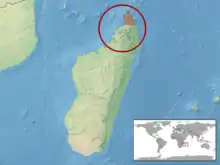| Petter's chameleon | |
|---|---|
_male_Montagne_d%E2%80%99Ambre.jpg.webp) | |
| Male in Montagne d'Ambre National Park | |
| Scientific classification | |
| Domain: | Eukaryota |
| Kingdom: | Animalia |
| Phylum: | Chordata |
| Class: | Reptilia |
| Order: | Squamata |
| Suborder: | Iguania |
| Family: | Chamaeleonidae |
| Genus: | Furcifer |
| Species: | F. petteri |
| Binomial name | |
| Furcifer petteri | |
 | |
| Geographic range of Furcifer petteri in Madagascar. | |
| Synonyms[2] | |
The Petter's chameleon (Furcifer petteri) is a species of chameleon, which is endemic to northern Madagascar. Furcifer petteri was initially described as the subspecies Chamaeleo willsii petteri by Édouard-Raoul Brygoo and Charles Domergue in 1966, but later transferred to the genus Furcifer and given full species status by Frank Glaw and Miguel Vences in 1994.
Etymology
Both the specific name, petteri, and the common name, Petter's chameleon, are in honour of French primatologist Jean-Jacques Petter.[3]
Geographic range
Furcifer petteri is endemic to Madagascar. Its type locality is the eastern edge of the Ankarana Reserve, specifically the Ankarana massif (French: Bordure Est du massif de l'Ankarana, Madagascar).[2]
Conservation status and habitat
Furcifer petteri is listed as a vulnerable species by the International Union for Conservation of Nature (IUCN) because its geographic range only covers an area of 11,000 square kilometres (4,200 square miles) in northern Madagascar, where the remaining forest is in decline.[1] It lives between 120 and 850 metres (390 and 2,790 feet) above mean sea level,[1] where it is threatened by mining, logging for rosewood and charcoal, and fires.[1]
Description
Male specimens are roughly between 16 and 18 centimetres (6.3 and 7.1 inches) in total length (including tail), and their main colour is deep green with lateral white stripes and white lips. The female specimens are slightly smaller than the males, and have similar colouration. When the females are excited, they change colours quickly, becoming yellow-lemon with two spots of light blue, and one of red.[4] An average of both genders shows a total length of 16 centimetres (6.3 inches).[4]
Taxonomy
Furcifer petteri was initially described as Chamaeleo willsii petteri by Brygoo and Domergue in 1966.[4] It is commonly known as Petter's chameleon.[5] According to the Integrated Taxonomic Information System, Furcifer petteri is the valid name for this species.[6]
References
- 1 2 3 4 Jenkins, R.K.B.; Andreone, F.; Andriamazava, A.; Anjeriniaina, M.; Brady, L.; Glaw, F.; Griffiths, R.A.; Rabibisoa, N.; Rakotomalala, D.; Randrianantoandro, J.C.; Randrianiriana, J.; Randrianizahana , H.; Ratsoavina, F.; Robsomanitrandrasana, E. (2020). "Furcifer petteri". IUCN Red List of Threatened Species. 2020: e.T172950A176385501. doi:10.2305/IUCN.UK.2020-3.RLTS.T172950A176385501.en. Retrieved 18 November 2021.
- 1 2 "Furcifer petteri | The Reptile Database". Reptile-database.reptarium.cz. Retrieved 2012-11-11.
- ↑ Beolens B, Watkins M, Grayson M (2011). The Eponym Dictionary of Reptiles. Baltimore: Johns Hopkins University Press. xiii + 296 pp. ISBN 978-1-4214-0135-5. (Furcifer petteri, p. 205).
- 1 2 3 "Furcifer petteri | Pantherchameleon, Furcifer pardalis ". Pantherchameleon.de. Retrieved 2012-11-11.
- ↑ "Petter's chameleon videos, photos and facts - Furcifer petteri ". ARKive. Archived from the original on 2012-04-18. Retrieved 2012-11-11.
- ↑ "ITIS Standard Report Page: Furcifer petteri ". Itis.gov. Retrieved 2012-11-11.
Further reading
- Brygoo E-R, Domergue CA (1966). "Notes sur Chamaeleo willsi Günther, 1890, et description d'une sous-espèce nouvelle C. willsi petteri n. ssp." Bulletin du Muséum d'histoire naturelle, Paris 38 (4): 353-361. (Chamaeleo willsi petteri, new subspecies). (in French).
- Glaw F, Vences M (1994). A Fieldguide to the Amphibians and Reptiles of Madagascar, Second Edition. Cologne, Germany: Vences & Glaw Verlag/Serpents Tale. 480 pp. ISBN 978-3929449013. (Furcifer petteri, new combination).
